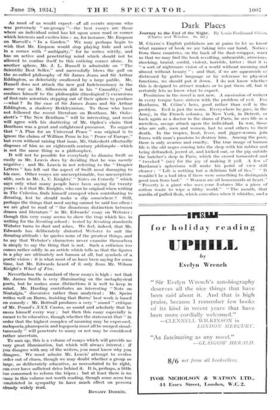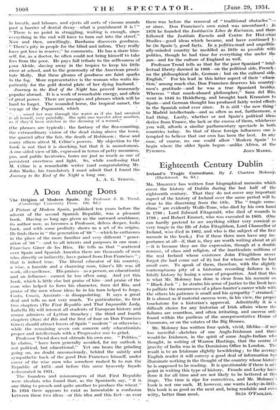Dark Places
Journey to the End of the Night. By Louis-Ferdinand Wino. (Chatto and Windus. 8s. Cad. ) M. CELTNE'S English publishers are at pains to let us know what manner of book we are taking into our hand. Notice; from three countries, on the back of the dust-wrapper, warn us that we may find the book revolting, unbearable, atrocious, shocking, brutal, sordid, violent, horrible, bitter : that it is " a sort of nightmare vision of a world without meaning and almost without beauty " : and that, if we are squeamish or distressed by gutter language or by reference to physical functions, we should put it down. I do not know whether this is designed to attract readers or to put them off, but it certainly lets us know what to expect.
Pessimism in the novel is not new. A succession of writers in every tongue have striven with the problem of evil. For -Bardamu, M. Celine's hero, good rather than evil is the problem. Evil is just the norm. Everywhere he goes, in the Army, in the French colonies, in New York, in Detroit, or back again as a doctor in the slums of Paris, he secs life as a merciless, savage attack upon the individual. In war, those who are safe, men and women, lust to send others to their death. • In the tropics, heat, fever, and jigger-worms join forces with man's passions to destroy him. Among the poor, there is only avarice and cruelty. The true image of human life is the old negro coming into the shop with his rubber and being defrauded, jeered at, and kicked out, or the pig outside the butcher's shop in Paris, which the crowd tormented and " tweeked " (sic) for the joy of making it yell. A few of Bardamu's aphorisms will make his point of view still clearer : " Life is nothing but a delirium full of lies." It wouldn't be a bad idea if there were something to distinguish good men from bad." " Women are all housemaids at heart." " Poverty is a giant who uses your features like a piece of cotton waste to wipe a filthy world." " The mouth, that corolla of puffed flesh, which convulses when it whistles, suel s in breath, and labours, and .ejects all sorts of viscous sounds past a barrier of dental decay—what's punishment it is !'" " There is no point in struggling, waiting is enough, since "everything in the end will have to turn out into the street." Now and then, unwillingly, Bardaniu discovers goodness. " There's pity in people for the blind and infirm. They really have got love in reserve," he comments. He has a share him- self, for, *as a doctor, he often could not bring hiniself to take fees from the poor. He pays full tribute to the selflessness of poor Alcide, slaving away in the tropics to keep his little niece at school, and to the generosity of the American prosti- tute Molly. But these gleams of goodness are faint sparks in the fog. More representative is the woman who waits lin- ' patiently for the gold dental plate of her dying husband. ' - Journey to the End of the Night has proved immensely popular abroad. It is a work of remarkable energy, and often of great power. There are passages and phrases which will be hard to forget. The wounded horse, the tropical sunset, the voyage of the Papaoutah, which
. . . nosed her way through the water as if she had sweated it all herself, very painfully. She split one wavelet after anothiir, as if they'd been stitches in the dressing of a wound," (the phrases are typical) ; the fantasy of the flea-counting, the extraordinary vision of the dead rising above the town; the quarrel after the fair, the death of Robinson ; these and many others attest M. Celine's powers. My objection to the Book is not that it is shocking, but that it is monotonous. A one-sided view of life, expressed in terms of petty meanness, pus, and public lavatories, bores me just as much as one of persistent sweetness and light. So, while confessing that . M. Celine is a remarkable writer (arid congratulating Mi. John Marks, his translator), I must admit that I found the
Journey to the End of the Night a long one.
CZ
L. A. G. STRONG.





































 Previous page
Previous page